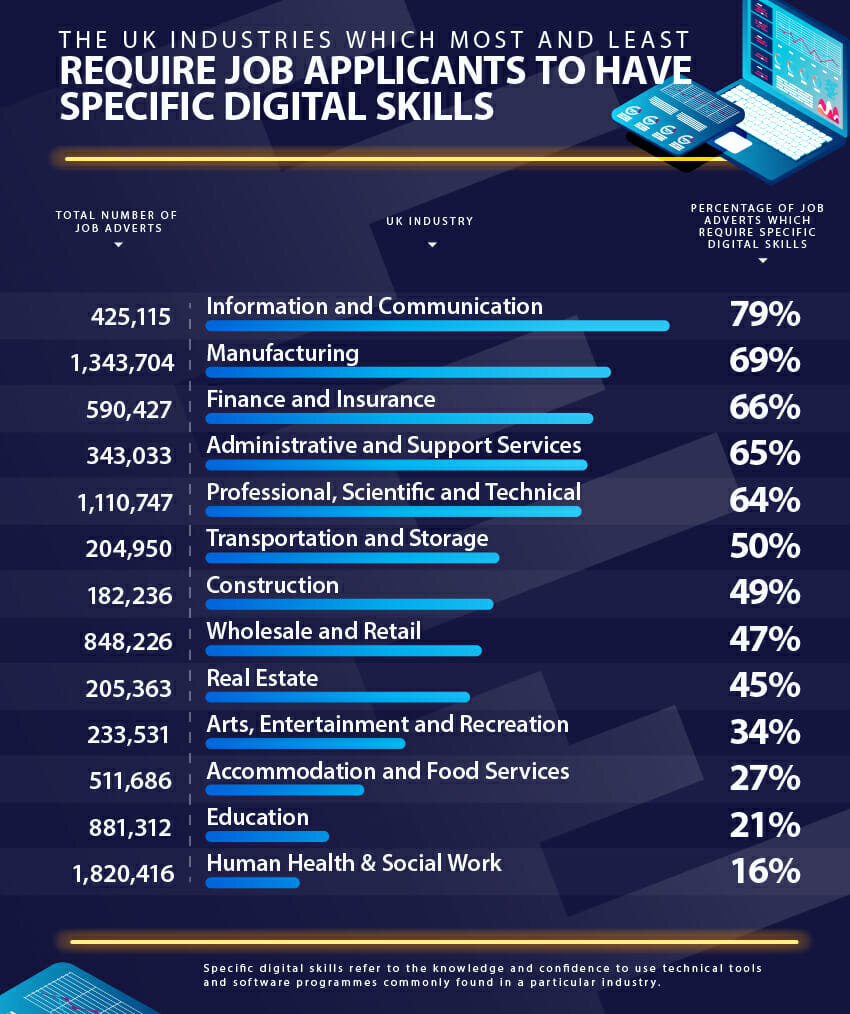- 69% of roles in manufacturing desire certain digital competencies from prospective candidates
- Jobs in information and communications (79%) most require applicants to have specific digital skills
- Positions in human health and social work (16%) least need job hopefuls to have specific digital capabilities
- A ‘lack of time’ (72%) is preventing a majority of individuals from learning/developing digital skills that can significantly improve their career prospects
For many, the start of a new year is the perfect incentive to make important changes to their life. One aspect a lot of Brits will tend to focus on is their job – as they look to move to another company or even pursue an entirely new career path.
In fact, recent research by workplace accreditation body Investors in People found that 24% of Brits will actively seek a new role in 2020.
Interested in the employment market, The Knowledge Academy analysed the latest findings from Gov.uk, who analysed over 8 million job adverts, to discover the UK industries that most and least require job applicants to have *specific digital skills.
The Knowledge Academy found that jobs in information and communications (79%) most require candidates to have specific digital skills.
Thereafter, 69% of roles in manufacturing desire specific digital competencies from prospective applicants.
Slightly below, 66% of openings in the finance and insurance sector need job hopefuls to have certain digital skills.
On the other end, positions in human health and social work (16%) least require candidates to have definitive digital proficiencies.
Slightly above, only 21% of roles in education need applicants to have specific digital capabilities.
Additionally, The Knowledge Academy surveyed 562 UK employees (who plan to change their job this year) to find out the mains barriers preventing them from developing their existing digital skills as well as learning new digital skills to significantly boost their career prospects.
From this, The Knowledge Academy found that a ‘lack of time (72%)’ is preventing a majority of employees from learning/developing valuable digital skills.
Joseph Scott, a spokesperson from the TheKnowledgeAcademy.com commented:
“It’s that time of the year where individuals are contemplating their careers and wondering if their job is giving them enough fulfilment. Those who conclude that they are unhappy in their current position, will undoubtedly search for new opportunities. Given that most industries have now been revolutionised by technology, companies need employees who can comfortably use different digital tools, programmes and software to drive business performance as well as achieve set objectives. Those entering the job market need to be aware of this, as this research clearly shows that certain industries are more demanding of particular digital skills than others”.
The other stumbling blocks stated by respondents include: ‘Not knowing where to start’ (67%), ‘feeling too lazy/tired’ (64%), ‘fear of failing’ (59%), ‘believing learning resources/courses will be too expensive’ (51%), ‘believing relevant learning resources/courses will be too hard to find’ (45%) and ‘feeling too old to learn new skills/digital skills’ (23%).
The Knowledge Academy’s top three tips for individuals wanting to learn/improve their digital competencies in 2020:
Assess the Job Market
Look at the required digital skills on the job specification of the roles you are interested in and then list them – this provides a focused approach towards what you should be aiming to learn.
Resources for Desired Digital Skills
Search for courses/podcasts/videos/websites/books which provide detailed and concise information/guidance/learning materials/interactive exercises on desired digital skills.
Schedule Time for Revision/Practice
Once you have identified key learning resources, schedule time for revision/practice – don’t be too ambitious with hours and try choosing days where you are more likely to be relaxed (i.e. weekends).





